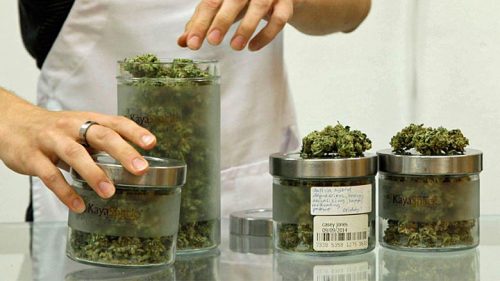Court: Cop Had No Right To Search Stoned 19-Year-Old Who Showed Up With Loaded Gun, Booze, and Pot at Milton High School
By State House News Service | August 29, 2017, 13:34 EDT

By Andy Metzger
STATE HOUSE NEWS SERVICE
BOSTON — In a split decision, the Massachusetts Supreme Judicial Court on Tuesday threw out firearms and drug convictions of a man who caused a lockdown at Milton High School two years ago.
Writing for the majority, former Justice Geraldine Hines, who retired from the court earlier this month, concluded a police officer responding to a call on a suspicious individual at the school lacked a “reasonable belief that the defendant was armed and dangerous” before conducting a pat frisk.
The officer found a firearm in the backpack of Jonathan Villagran, and the school was placed on lockdown in March 2015, according to the ruling.
Justice Elspeth Cypher joined in the dissent of Justice David Lowy, who wrote it was “eminently reasonable — and prudent — in these circumstances” for the responding police sergeant, Kristen Murphy, to probe Villagran’s backpack for weapons. Lowy said privacy expectations are different at schools.
Villagran showed up towards the end of the school day, telling an administrator he wanted to be let in to use the bathroom, and then falsely saying he was a student who wanted access to his locker, evidence at the trial showed, according to the decision. School officials became suspicious as Villagran left the school building but remained on the property, and they brought him into a conference room for questioning and alerted the police.
Villagran smelled of marijuana and alcohol and told school administrators he was there to meet a girl, according to the decision. When Murphy arrived she noted that the principal and vice principal of the school appeared to be “rattled” and the principal told the police officer, “He has something on him. I know he has something on him.”
Murphy conducted a pat frisk of Villagran’s pockets, turning up a bag of marijuana and a wad of nearly $3,000, according to the decision. When Murphy felt Villagran’s backpack, she detected a hard object and looked inside where she discovered a loaded handgun along with a bottle of alcohol, another bag of pot and a scale, according to the decision.
The school was placed on lockdown and about 20 Milton police officers responded to the situation, according to the ruling.
Villagran was a 19-year-old from Watertown and allegedly showed up at Milton High in the hopes of meeting up with a 16-year-old girl who attended a different school, according to Boston Globe coverage of the incident.
After a jury trial in Quincy District Court, Villagran was convicted of carrying a firearm without a license, carrying a dangerous weapon on school grounds, possession of a firearm without a firearm identification card, disturbing a school and possession of a Class D substance with intent to distribute, according to the decision.
However, Murphy did not have the authority to frisk Villagran’s bag, a majority of the court agreed.
“We acknowledge that the defendant, a nonstudent, was on school property surrounded by school officials who believed he possessed contraband of some sort. When Murphy arrived, however, she knew only that school officials had a male nonstudent detained in the conference room and that the police had been called for assistance in the matter,” Hines wrote. She wrote, “The principal voiced his strong suspicions of the defendant, but neither he nor the vice-principal reported any conduct suggestive of criminal activity. The odor of marijuana, which Murphy appreciated upon her entry into the conference room, also was not sufficient to support reasonable suspicion of criminal activity.”
The high court, which now features a majority of appointees of Massachusetts Governor Charlie Baker, concluded “the police officer lacked reasonable articulable suspicion that the defendant had committed a crime and that the circumstances of the encounter with the defendant did not warrant a reasonable belief that the defendant was armed and dangerous to the officer or others. Nor was the search permissible under any exception to the warrant requirement.”
The seven-member court also tossed out Villagran’s conviction on a disturbing a school charge, saying it was based in part on his possession of a firearm.
Lowy contended that people have a lower expectation of privacy when attempting to enter schools.
“An individual who attempts to gain entry to a school, where public access is restricted, does not have the same expectation of privacy as an individual in a home, on a street corner, or even in a motor vehicle,” Lowy wrote in his dissent. He wrote, “Even without specific facts to suggest that he was armed, the location, the timing, the suspicious nature of the defendant’s conduct, and his potential intoxication warranted the officer’s concern for the safety of students at the school.”
Villagran’s appellate attorney, Mathew Brian Zindroski, said the decision “clarified” that people retain constitutional protections from police searches in schools.
“I’m happy that the court decided this way to extend his constitutional rights despite the political issue of guns in a school zone,” Zindroski told the News Service.
Zindroski said he did not think the prosecution will re-try the case and said he doesn’t think there would be an avenue to introduce the firearm as evidence at a new trial, given the ruling.










